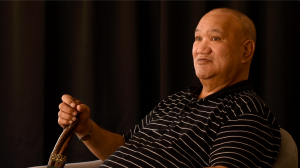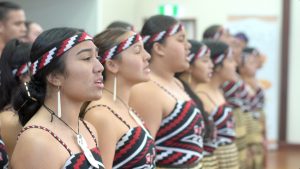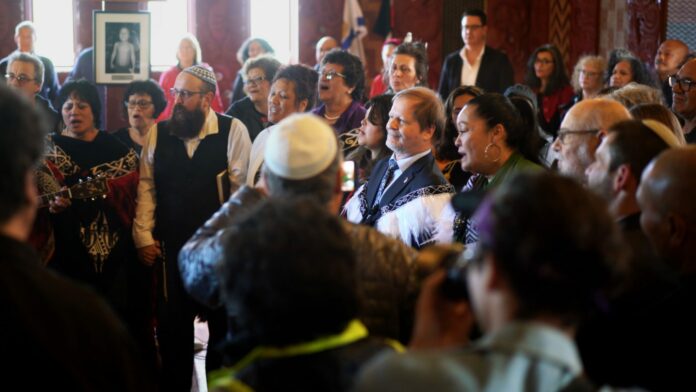“I want to be your friend”
These were the words of Māori tribal elder Pat Ruka to the Israeli ambassador to New Zealand, His Excellency Dr Itzhak Gerberg, in a warm and moving ceremony recently held in the traditional Māori meeting place, the Marae.
Ruka spearheaded the staging of a special event to welcome back the ambassador after he was recalled, following New Zealand’s infamous co-sponsoring of the anti-Israel UNSC Resolution 2334 in 2016.
Many Māori from around the country gathered to participate in the ceremony of apology (whakapāha), to seek forgiveness for New Zealand’s actions, and to honour and welcome the Israeli ambassador.

During the speechmaking, Pat Ruka expressed the deeply held feelings of his ancestors towards the people of Israel:
“Our ancestors have cried for the day that they could meet with the sons of Abraham. ‘Cause you were the people of hope, the people of light. Welcome to my whare (meeting house). Welcome… I, like them, have waited for this day”.
Pat Ruka remembers his forbears’ stories of deep regard for the Jewish people. Many, in the 19th century had embraced Christianity but became disillusioned by the inconsistency and hypocrisy of the Pākehā (Europeans), who seemed not to take their own beliefs seriously. After much discussion on the Marae, Ruka’s forebears came to the conclusion that although the fruit was bad, the seed remained good seed. They concluded that this was “the seed of Abraham with promise”.
 Ruka’s story is by no means unique amongst Māori. Indeed, the Māori connection with the Jewish people has deep roots. From the time of early European settlement intermarriage occurred between Jew and Māori. On a spiritual and historical plane, Māori in the 19th century identified with the suffering of the Israelites and this provided inspiration for the development of unique Māori prophetic movements. Some movements, such as Ringatū, see themselves as Jews. Theories circulated about Māori being one of the “Lost Tribes of Israel” and while these were debunked, missionaries to New Zealand were so fascinated by the similarities between Māori and Jew that they drew up lists of shared characteristics. Jewish place names like Jerusalem, Bethlehem and Judea sprang up around the country.
Ruka’s story is by no means unique amongst Māori. Indeed, the Māori connection with the Jewish people has deep roots. From the time of early European settlement intermarriage occurred between Jew and Māori. On a spiritual and historical plane, Māori in the 19th century identified with the suffering of the Israelites and this provided inspiration for the development of unique Māori prophetic movements. Some movements, such as Ringatū, see themselves as Jews. Theories circulated about Māori being one of the “Lost Tribes of Israel” and while these were debunked, missionaries to New Zealand were so fascinated by the similarities between Māori and Jew that they drew up lists of shared characteristics. Jewish place names like Jerusalem, Bethlehem and Judea sprang up around the country.
In the twentieth century, the involvement of the Māori in World War I and II created strong affinities with the land of Israel and its people. The revival and restoration of the Hebrew language provided inspiration for Te Reo (Māori language) advocates and the Israeli ulpan system of full immersion inspired the establishment of Kohanga Reo language nests. The Māori Queen, Dame Te Atairangikaahu, showed her affection for Israel by participating in the Jerusalem 3000 celebrations in the Waikato in 1995 and this support has been continued with King Te Arikinui Tūheitia.
One of the most well known sayings in Maoridom is:
He aha te mea nui o te ao, he tangata, he tangata, he tangata.
What is the most important thing in the world, it is the people, the people, the people.
Much of the ceremonial aspect of Maori culture has to do with establishing relationships. The formalities that take place in a meeting such as the Aotearoa/Israel Powhiri establishes whether the visitor comes in peace or hostility. The speechmaking process establishes who you are and how you relate to each other. The exchange of gifts indicates reciprocity of friendship. The formal greeting of the Hongi (pressing noses) is a sharing together of the breath of life. The eating together signifies that the friendship is complete, we are all one (He iwi kotahi tatou).
While the relationship of New Zealand Jews to the Māori people has a long history, the Aotearoa/Israel Powhiri is the first official Māori ceremony to establish this particular kind of link with Israel. It is a friendship that many Māori have longed for and is likely to be enduring.
By Sheree Trotter
Sheree is a Māori New Zealander (Te Arawa) and Ph.D candidate (History) at the University of Auckland, New Zealand.
Originally posted on Times of Israel
[FB_IINZcomments]



